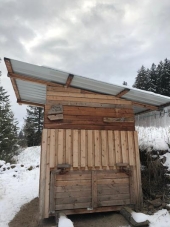
















A human being should be able to change a diaper, plan an invasion, butcher a hog, conn a ship, design a building, write a sonnet, balance accounts, build a wall, set a bone, comfort the dying, take orders, give orders, cooperate, act alone, solve equations, analyze a new problem, pitch manure, program a computer, cook a tasty meal, fight efficiently, die gallantly. Specialization is for insects.
-Robert A. Heinlein




Chris Kott wrote:Peter, I feel that in an economic climate this perilous, proposing a transition to something so different could be so destabilizing as to prove fatal. Which might not be bad, if what replaced it didn't turn out to be patchwork corporate fiefdoms, little consumerist despotisms where people are sold to the company before they're born for the guarantee of food and safety. In such a situation as you describe, the land lots nearer to infrastructure and urban centres would see more demand, and therefore be worth more. Even if they could only be traded for other property, I think what would happen is the far-flung plots would be traded in handfuls by those who can do so for individual plots nearer the towns. If you tried to keep it one to one, there would be no incentive for those with the best land to trade with those with lesser land, which is just fostering another kind of inequality.-CK




Chris Kott wrote: The answer to our economic woes is never just to give people stuff. I will try to say it in another way: A thing given freely has no value. It is free. What incentive is being given for people to value it? You're seeking to cheapen what it means to be a landowner. What you propose would anger a great many landowners who've worked hard for the land they own, and for whom any amount of land that he and everyone else could be handed for free would be a pittance. What you are proposing essentially amounts to the destruction of all wilderness in Canada, much like what you see outside of National and State parks in the States. In my opinion, your idea is a terrible one, and badly thought out. I would advise you to revise your reading list if this is where it's leading you. -CK




















A human being should be able to change a diaper, plan an invasion, butcher a hog, conn a ship, design a building, write a sonnet, balance accounts, build a wall, set a bone, comfort the dying, take orders, give orders, cooperate, act alone, solve equations, analyze a new problem, pitch manure, program a computer, cook a tasty meal, fight efficiently, die gallantly. Specialization is for insects.
-Robert A. Heinlein




A human being should be able to change a diaper, plan an invasion, butcher a hog, conn a ship, design a building, write a sonnet, balance accounts, build a wall, set a bone, comfort the dying, take orders, give orders, cooperate, act alone, solve equations, analyze a new problem, pitch manure, program a computer, cook a tasty meal, fight efficiently, die gallantly. Specialization is for insects.
-Robert A. Heinlein








A human being should be able to change a diaper, plan an invasion, butcher a hog, conn a ship, design a building, write a sonnet, balance accounts, build a wall, set a bone, comfort the dying, take orders, give orders, cooperate, act alone, solve equations, analyze a new problem, pitch manure, program a computer, cook a tasty meal, fight efficiently, die gallantly. Specialization is for insects.
-Robert A. Heinlein








A human being should be able to change a diaper, plan an invasion, butcher a hog, conn a ship, design a building, write a sonnet, balance accounts, build a wall, set a bone, comfort the dying, take orders, give orders, cooperate, act alone, solve equations, analyze a new problem, pitch manure, program a computer, cook a tasty meal, fight efficiently, die gallantly. Specialization is for insects.
-Robert A. Heinlein




Dale Hodgins wrote: I have traveled to many of the sorts of places where this land is available. There are residency requirements and development requirements. I've also checked out lots of land which was selling for between $15 and $100 per acre. There were very good reasons for this cheap price and I ended up buying land in a more hospitable climate where people live. The $15 per acre stuff was north of Sudbury Ontario. It was clear-cut black spruce and Aspen. In that climate it takes about 75 years to get any useful stand of forest. The land tax over time ends up costing considerably more than the original purchase price. I'm a Canadian and have been to every province and have never encountered any free land which was worth owning.
A century ago there were great opportunities for free land, then the government thought it would be a good idea to create northern development through land giveaways. Distance and climate have kept most of these communities from thriving.
To see just how far governments will go to create development in inhospitable climates check out what the Soviet Union managed to do in Siberia. They moved hundreds of thousands of people into some horrible spots. Today the offspring of these people invariably head south.












I have never met a stranger, I have met some strange ones.

|
girl power ... turns out to be about a hundred watts. But they seriously don't like being connected to the grid. Tiny ad:
turnkey permaculture paradise for zero monies
https://permies.com/t/267198/turnkey-permaculture-paradise-monies
|


